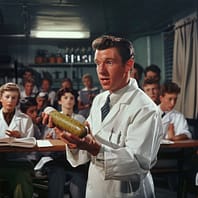The Elephant in the Bedroom
Imagine this: you’re all geared up for a marathon but realize you’ve shown up at a chess tournament. That’s a bit what it feels like dealing with low libido—prepared for action, only to find your enthusiasm is playing a different game. It’s an issue more common than many think, affecting a significant number of gents across the globe. Yet, despite its prevalence, it’s often treated like the room’s oversized, unmentionable pachyderm.
Talking about sex drive, or the lack thereof, isn’t exactly table talk at family dinners or pub banter with the mates. But here’s the kicker: opening up about it can actually be the first step towards resolution. So, let’s break the ice with a bit of humor, shall we? Consider this a no-judgment zone, where low libido is less of a taboo and more of an open forum for discussion. After all, knowledge is power, and laughter is a close second.
What Exactly Is Low Libido?
Low libido is essentially the tech support of the sex world: sometimes it’s on, sometimes it’s off, and occasionally, it needs a bit of troubleshooting to get back online. Unlike erectile dysfunction, which is all about performance, low libido doesn’t even get you to the stage—it’s the lack of wanting to perform in the first place.
Just like our taste in music or clothes, libido varies from one person to another and changes over time. Some days you’re the lead singer of a rock band; other days, you’re more of a backstage crew kind of guy. And that’s perfectly normal. If the “average” man’s sexual appetite were a dish, it would be a buffet—vastly varied and subject to change depending on the day.

Signs and Symptoms: More Than Just “Not in the Mood”
Spotting low libido isn’t just about tallying how many times you’ve declined bedroom gymnastics for a night with Netflix (though, let’s be honest, sometimes that’s a pretty strong indicator). It’s about noticing a consistent lack of interest in sexual activity, a disinterest that feels out of character and maybe even a bit frustrating.
Other signs might be more subtle, like finding that your fantasies have packed up and gone on an extended holiday, or realizing that your morning wood has become more of a rare event than a daily sunrise. It’s important to listen to these signals. They’re like the check engine light on your car—ignoring them won’t make the issue go away.
Yet, as we chuckle over choosing documentaries over duvets, remember, it’s okay to take this seriously. Recognizing these signs is the first step towards getting back in the driver’s seat of your libido.
The Culprits Behind the Curtain: Unraveling the Causes
The reasons behind a lagging libido are as varied as the fish in the sea. From hormonal imbalances to the stress of being an adult (because let’s face it, adulting can be a mood killer), understanding these causes can help you navigate the murky waters of low libido.
Hormonal imbalances play a significant role. Testosterone, the hormone that could be considered the fuel to your sexual fire, can sometimes dip lower than your enthusiasm for doing taxes. When this happens, your desire can wane, leaving you feeling more blah than rah-rah.
Psychological factors are another major player. Stress, depression, and relationship issues can turn your libido into a hermit, hiding away from the world. It’s like your mind’s way of saying, “I’ve got enough on my plate without adding sex to the menu, thank you very much.”
Hard Truths: Uncovering the Reality Behind ED Myths(Opens in a new browser tab)
Lifestyle and health-related factors also weigh in. A diet more focused on fast food than nutrients, a vendetta against the gym, or treating sleep like a luxury rather than a necessity can all dampen your sex drive. It’s akin to expecting a high-performance car to run on empty—it’s just not going to happen.
Lastly, medications and health conditions can act like a wet blanket on your libido. Certain meds have the unfortunate side effect of deflating your sexual desire faster than a balloon two days after a party. Conditions like diabetes or high blood pressure can also play a role, proving that what’s happening below the belt is more complex than you might think.
Understanding these causes is like putting together a puzzle—it’s only by fitting the pieces together that the bigger picture starts to emerge.

Diagnosis and When to See a Doctor
Recognizing the need to see a doctor for low libido is a bit like admitting you’re lost and finally deciding to ask for directions—it goes against many men’s DNA. But just as you wouldn’t drive around aimlessly hoping to stumble upon your destination, there’s no need to navigate the murky waters of low libido without a map.
If your sex drive has taken a prolonged vacation without any signs of return, it’s time to consult a professional. This is especially true if the change is sudden, affects your relationship, or is accompanied by other symptoms like erectile dysfunction or depression. Think of it as seeking a GPS signal in an unfamiliar city; sometimes, you need external help to find your way back.
Navigating the Waters: Treatment and Management
The journey to reignite your libido is not a one-size-fits-all. It ranges from lifestyle tweaks to potentially seeking medical interventions. Picture trying to improve your Wi-Fi signal—sometimes moving closer to the router (i.e., making lifestyle changes) does the trick, but other times you may need to call in a professional to upgrade your equipment.
Open dialogue with your partner and healthcare provider is key, even if broaching the subject feels as awkward as a middle school dance. Remember, they’re on your team, rooting for you to find your groove again.
Self-care plays a starring role in this narrative. Regular exercise should be on your to-do list, but think of it less like a chore and more like training for the fun kind of bedroom Olympics. Diet also matters; eating well is not just about getting into shape but fueling the fires of desire. And let’s not forget sleep—essential for recharging not just your body but also your sexual energy.
The Role of Communication and Support
Discussing libido issues with your partner can feel as daunting as confessing you forgot an anniversary. However, open communication is the bedrock of navigating this together. And remember, sharing feelings and seeking support is not just the domain of rom-com leads; it’s real-life stuff that strengthens relationships.
The Light at the End of the Tunnel
In the grand scheme of things, experiencing low libido is not a verdict on your masculinity or desirability. It’s a bump on the road of life, one that many men traverse at some point.
As we wrap up this journey, remember that with the right approach, a dash of humor, and support from those around you, this too shall pass. Keeping the flame alive doesn’t mean burning at full tilt all the time. Sometimes, it’s about maintaining a steady glow that lights up the right moments. So, here’s to health, happiness, and finding the right balance in the bedroom and beyond.
| Relevant ED Data and Statistics |
| Prevalence of Low Libido: A study found that approximately 15% to 16% of men experience low libido at some point in their lives. |
| Testosterone Levels: On average, men’s testosterone levels decrease by about 1% per year after the age of 30. |
| Impact of Lifestyle Factors: Research indicates that over 70% of men with poor lifestyle choices (like lack of exercise, poor diet) report lower sexual desire compared to those with healthier lifestyles. |
| Mental Health Connection: Depression has been linked to low libido in men, with studies suggesting that up to 75% of individuals with depression experience a decreased sex drive. |
| Medication Effects: It is estimated that up to 25% of cases of low libido in men can be attributed to medication side effects, especially from antidepressants and blood pressure drugs. |



